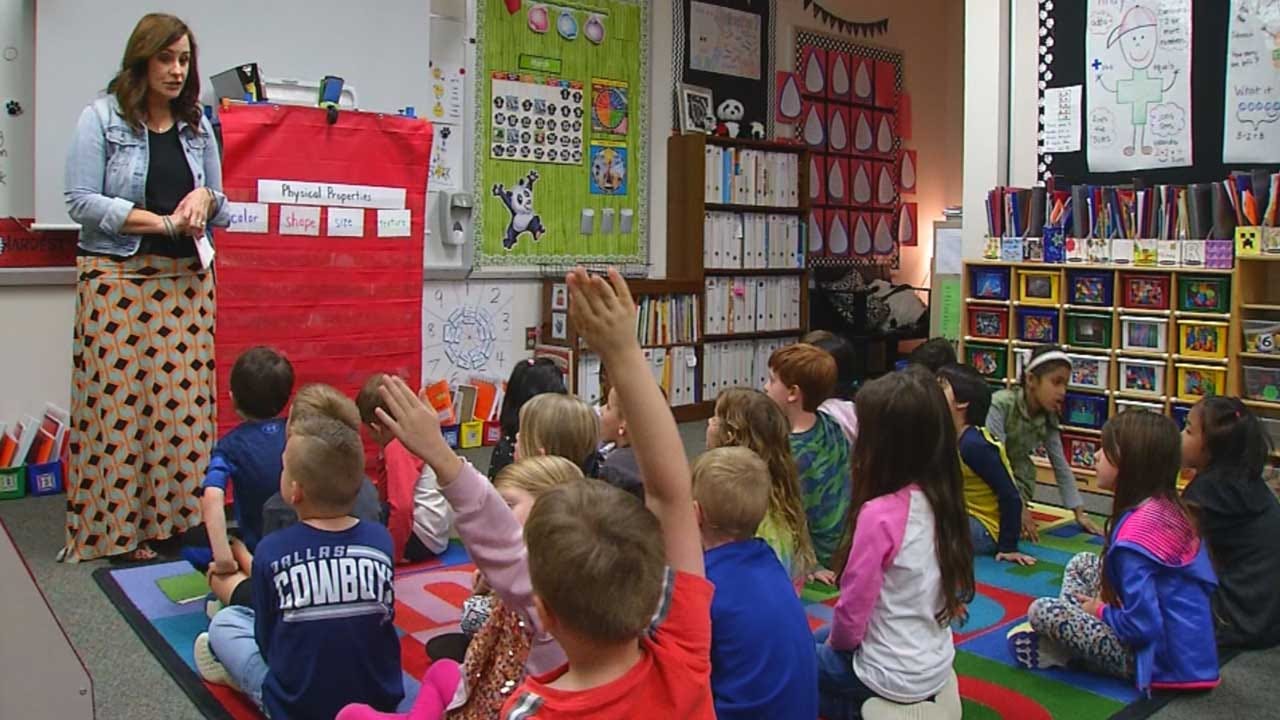9 Investigates: Oklahoma Still Losing Teachers Despite Pay Raises
When Oklahoma lawmakers approved a $6,000 pay raise for teachers just before the end of the 2017-18 school year, the hope was that bringing Oklahoma salaries more in line with the regional average would stanch the flow of teachers to neighboring states. IThursday, June 6th 2019, 11:24 pm
When Oklahoma lawmakers approved a $6,000 pay raise for teachers just before the end of the 2017-18 school year, the hope was that bringing Oklahoma salaries more in line with the regional average would stanch the flow of teachers to neighboring states.
Instead, the departures continued unabated, and Oklahoma school districts had to hire a record number of emergency certified teachers to fill the vacancies.
"There is a teacher shortage across this country," said Joy Hofmeister, Oklahoma Superintendent of Public Instruction, "but in Oklahoma it's even more severe, frankly, because there's a shortage everywhere else."
You don't have to read between the lines to understand what Superintendent Hofmeister is saying: the teaching profession has become less attractive everywhere, but perhaps nowhere is it less attractive right now than in Oklahoma.
Hofmeister and other education leaders in Oklahoma believe they know how to change that, and it begins with understanding why so many teachers have been willing to uproot and move out of state.
"I didn't have any plans of doing this," said Amy Hardesty, a Kindergarten teacher in the Frisco Independent School District (ISD).
Hardesty just finished her first year of teaching at Frisco's Fisher Elementary School, her 19th year of teaching overall. She spent most of those years teaching in Norman Public Schools, including last year, when she joined fellow Norman teachers and others from across the state in a two-week walkout that helped get teachers a much-needed raise.
But the walkout fell short of most educators' goals. Specifically, lawmakers did not agree to allocate new funding for classrooms.
"You know, it was a little disheartening when it was over," Hardesty admitted, "because our schools aren't fully funded."
Instead of feeling bolstered by the raise teachers had won, the failure to secure additional classroom funding left her with a sense of foreboding.
"I remember having a talk and just saying, 'You know, this is gonna get worse', Hardesty recalled.
Not long after that, an image of a billboard popped up on her Facebook newsfeed. The billboard was advertising -- to Oklahoma -- starting teacher pay in Fort Worth at $52,000.
"I had 18 years’ experience," Hardesty stated, "and the number on the board for the starting pay...was going to be about 12,000 more than I was making."
Hardesty says she looked at her husband, a Norman-area pastor, and told him she just wanted to take a look at teaching positions in the North Dallas area.
"And what I found was, for my experience, it was about a $20,000 raise to come down here," Hardesty said, "so I looked at him and said, 'That pays for college.'"
She joined 30,000 other Oklahoma teachers who have left the state, or left teaching, in the last six years -- a departure rate 30 percent higher than the national rate.
“I don’t think you can overstate the potential negative impact,” said OKCPS Superintendent Sean McDaniel.
McDaniel is talking about the impact of having to fill the resulting vacancies with emergency certified teachers, something districts statewide did 3,034 times this year including 336 time in OKC.
“And imagine that that's in a third-grade class with 30 kids. Immediately they're going to feel the impact of that, and then they get behind and it compounds over the years,” said McDaniel.
And compounding the mass exodus problem is the fact that Oklahoma colleges are producing fewer new teachers. From 2011 to 2016, the number of education majors in Oklahoma dropped from 24,000 to 14,000 – a 40% decline!
And more of those who are in the pipeline are starting their teaching careers somewhere other than Oklahoma.
“It was definitely very hard to leave my family and, I mean, just like—I grew up in Oklahoma my whole life,” said Lauren Branch.
But after Lauren Branch graduated from OU last year, she also headed to Texas.
She'd seen how her sister, who was teaching in Oklahoma and had become a mother, had to quit because her salary didn't cover the cost of daycare.
“And so that kinda [sic] made me start thinking, ya know, I want to get married, I want to have kids, and so for me it just didn't seem logical to start my career there,” said Branch.
“Yes, pay matters,” said State Superintendent Hofmeister.
Hofmeister is encouraged that teacher pay is getting better but says truly solving the teacher shortage will require a shift in priorities.
“If Oklahoma is going to be a national leader… If we're going to be a top 10 state, we have to have a new level of value on education,” said Hofmeister.
Other educators agree and say that means renewed and consistent investment in the classroom -- in technology, textbooks and training -- enough to erase recent bad memories.
“We had 10 years of cuts, we had 10 years of changing standards, we had 10 years of increasing class sizes and less and less funding,” said OEA President Alicia Priest.
Ultimately, that's what drove a long-time Oklahoma teacher like Hardesty to consider leaving.
“It’s paid off, it’s been a great experience,” said Hardesty.
And now that she has, she doesn't see herself coming back.
More Like This
December 5th, 2019
October 17th, 2019
August 29th, 2019
Top Headlines
April 27th, 2025
April 27th, 2025
April 27th, 2025













